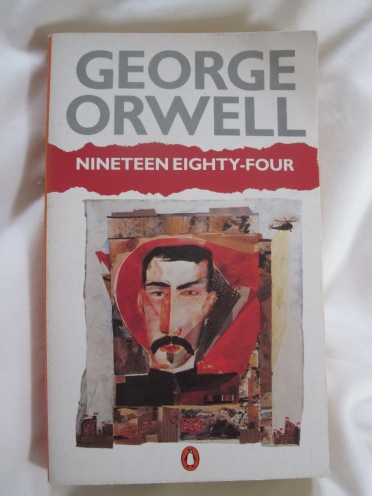Last night to the flicks. All war films. One very good one of a ship of refugees being bombed somewhere in the Mediterranean. Audience much amused… man trying to swim away with a helicopter after him… saw him through the helicopters gunsights… the sea round him turned pink… audience shouting with laughter…you saw a lifeboat full of children with a helicopter hovering over it… a middle-aged woman… a little boy about three years old in her arms… screaming with fright… covering him up….as if she thought her arms could keep the bullets off him….then the helicopter planted a 20 kilo bomb in among them…a lot of applause.

I started re-reading 1984 by George Orwell this summer as I hoped it would be antidote to a terrible year, that it would show me that no matter how bad things seemed politically, socially and financially; they could be worse. Unfortunately it has seemed more and more as if Orwell’s nightmare future is coming closer by the day. The relentless parade of xenophobia disguised as patriotism has been sickening to watch, the UK parliamentary conference season and the headlines in the British press meant I didn’t recognise my country nor want to be a part of it.
I’ve not blogged for a few weeks or been active in social media and one of my few tweets was along the lines of how I intended to never write about my personal feelings or politics or contentious issues – and how therefore 2016 was the wrong year to have taken up being more active as a writer. There is so much this year, around the world, that stirs a visceral and horrified response. Not just politics – although my longing for the US election to be over is only equalled by my fear of what will follow – whoever wins. So much hatred has been stoked on both sides of the Atlantic, experts are mocked and ignored, ignorance and lies appear to be welcomed and anyone who expresses concern or dissent is told to “get over it” or that they will “get what they deserve,” while Syria is torn apart and aid convoys are bombed with impunity.
The fear of immigrants has been fuelled for years but there was still an outcry when they were described as “swarms” or “hoards” and people seemed to remember that they were in fact human beings – although it took pictures of a child’s dead body to make some people realise this. And now this year they are back to being demonised, or worse, dehumanised. Any offer of shelter or help is contested and given begrudgingly, if at all.
The passage I have quoted from above is on the 6th page of 1984 and it shocked me out of the book with a sickening familiarity. These last few years have been full of tragedies in the Mediterranean, most people now turn away and ignore such stories, the thought of the sea being patrolled simply to turn back such boats, not to help them, is approved. We are not yet at the stage of deliberately sinking them – although there have been reports of grappling hooks used on inflatable boats – nor of bombing them and filming such acts for entertainment – but is it really as impossible to imagine as it ought to be? Some of the baying, jeering crowds we have seen this year might well cheer at such news; how long till they actively welcome the idea and salivate at it?
The image of the refugee woman sheltering the child is revisited later in 1984 when Winston Smith recalls scenes from his own life. The poignancy in the simple description of that sheltering arm, of one human drawing another closer, offering shelter and protection despite knowing it is futile, is, I believe, one of the key messages of the book. The fight to stay human, to care for another person over oneself, to offer hope, aid and shelter even when you have little yourself and know it will never be enough but do it anyway. I’m desperately hoping that 2016 is not the year that urge is obliterated.
